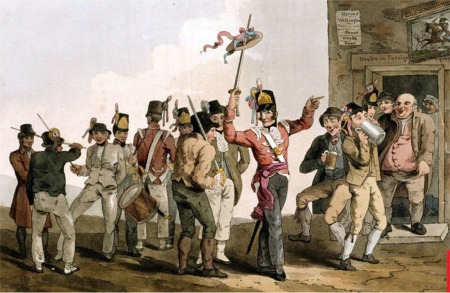|
The following details for the Buffs are provided by Blaxland and Joseph's service is drawn from musters and paybooks (National Archives).
In late February or early March 1804 Joseph answered his country's call for the third time. He joined Captain Bacon's Company in the 2nd Battalion of the 3rd Regiment of Foot, or Buffs as they were called because of the facings on their uniform. The 2nd Battalion had been formed at Portsmouth in July 1803 and served at home as a regimental depot sending reinforcements to the 1st Battalion who were in Madeira in 1807 and saw service in Portugal in 1808-1809.
In the first half of 1804 Corporal Joseph Ratcliff was quartered at Maidstone and Tilbury Fort. He was promoted to Sergeant in May raising his pay to about 1s 6d per day. His experiences in North Holland and Egypt would no doubt have served him well as he prepared new recruits to reinforce the 1st Battalion. He was stationed at Chatham in August and Horsham in September.
 A recruiting party in full flow
Regulations were introduced in 1802 requiring infantry recruits to be no older than 25 years and no less than 5ft 6in tall, although 'growing lads' between 17 and 19 years old could be taken if they were taller than 5ft 5in. These standards were formally relaxed later in the war, allowing recruits up to 30 years old providing that they were at least 5ft 5in tall, or 'growing lads' who were at least 5ft 4in. If he agreed to enlist in the army a young man was given a shilling - a day's pay before deductions. He was then required to pass a rudimentary physical examination by an army surgeon and to swear before a magistrate that he didn't have any hidden illness, wasn't an apprentice, and did not already belong to the Army or Navy. He could choose to enlist for seven years or for life and would receive a substantial bounty of several months pay.
That was the theory. In practice, the rules were bent as recruiting parties were well paid for each man successfully enlisted. They searched for able bodied men everywhere from country villages to city streets. And if the stories of easy life as a soldier, swift promotion and women's attraction to men in red coats didn't convince a potential recruit, then they could always be entertained with spirits at a hostelry until they were so drunk that the following day they would be unable to recall that they had taken the shilling! The new recruit was also surprised when a large portion of his bounty was taken to pay for part of his uniform and other miscellaneous expenses. Whatever remained was often quickly spent on drink for his new comrades.
October 1804 saw the Battalion at Portsmouth Hilsea Barracks en route to Alderney where they formed part of the garrison from November that year until June 1806. Joseph served under a succession of company commanders in 1805. Captain Bacon reduced him to Private on 22nd February 1805, one of his last acts before he handed command of the company to Captain Tuckett. By 25th April Joseph had transferred to Captain Dawson's Company as Corporal and by 25th July had been promoted to Sergeant. He served in Captain Michael Colville's Company from 25th September, although Colville was absent without leave from 25th October until 24th March 1806! From June until December 1806 the Battalion was in Guernsey.
Sergeant Joseph Ratcliff was recruiting at Monaghan in Ireland from January to August 1807 initially under Captain Colville although command was soon transferred to Captain Richard Burke. He must have been familiar with the area from his days with the 27th whose regimental depot was at nearby Inniskilling. From September 1807 until June 1808 the Battalion was back in England and stationed near Kingsbridge in temporary barracks for 600 men which had been built in 1804 on the east side of the estuary at Dodbrooke. They moved to Bury Head near Brixham at the end of June 1808 where the barracks could accommodate several battalions and were protected by two regular fortresses with ditches and drawbridges.
Now nearly 50 years old, Joseph transferred to the 8th Royal Veteran Battalion on 16th May 1809.
|



